Turn Google Play Money Into Real Money
One year ago, Google and LG brought us the Nexus 4 and introduced a new model for buying smartphones. Not only did it bring competitive specifications, it did so in an attractively minimalistic package. However, the best part of the Nexus 4 was, undoubtedly, its price point. For a cost far smaller than a majority of its competitors, users could get a great unlocked phone without the tethers of a contract.
In the year that followed, the masses looked forward to the next iteration of the Nexus smartphone line. Not only have fans of the Nexus looked to this update for yet another well performing yet affordable device, they eagerly anticipated the next iteration of the maturing Android operating system. Google and LG have teamed up once again to do just that.
Enter the Nexus 5.
Read on for the full review and watch the video review to see if this new Nexus 5 lives up to the expectations.
| Display | 4.96-inch IPS LCD, Full HD (1920 x 1080), 444 ppi |
|---|---|
| Processor | Qualcomm Snapdragon 800 MSM8974, quad-core Krait 400 @ 2.3GHz, Adreno 330 GPU |
| RAM | 2GB |
| Storage | 16GB/32GB |
| Battery | 2300 mAh non-removable, wireless charging |
| Cameras | 8 MP rear, OIS, autofocus, LED flash, 1.3 MP front |
| Networks | LTE (2, 4, 5, 17, 25, 26, 41) 3G (850, 900, 1700, 1900, 2100) GSM (850, 900, 1800, 1900) |
| Connectivity | NFC, A-GPS, GLONASS, microUSB, Wi-Fi a/b/g/n/ac, Bluetooth 4.0 LE |
| OS | Android 4.4 KitKat |
| Dimensions | 137.84 x69.17 x 8.59mm, 130g |
| Colors | Black/White |
When it comes to the design of the Nexus 5, the operative word is, without a doubt, minimalism. This new Nexus smartphone comes in two flavors – black or white – giving users a choice that, with the Nexus 4, came quite late and remained pretty short lived. While the black version has a soft touch plastic motif, the white edition sports a straight plastic white back contrasting with the black front. For more information on the differences between the two versions, see our color comparison.
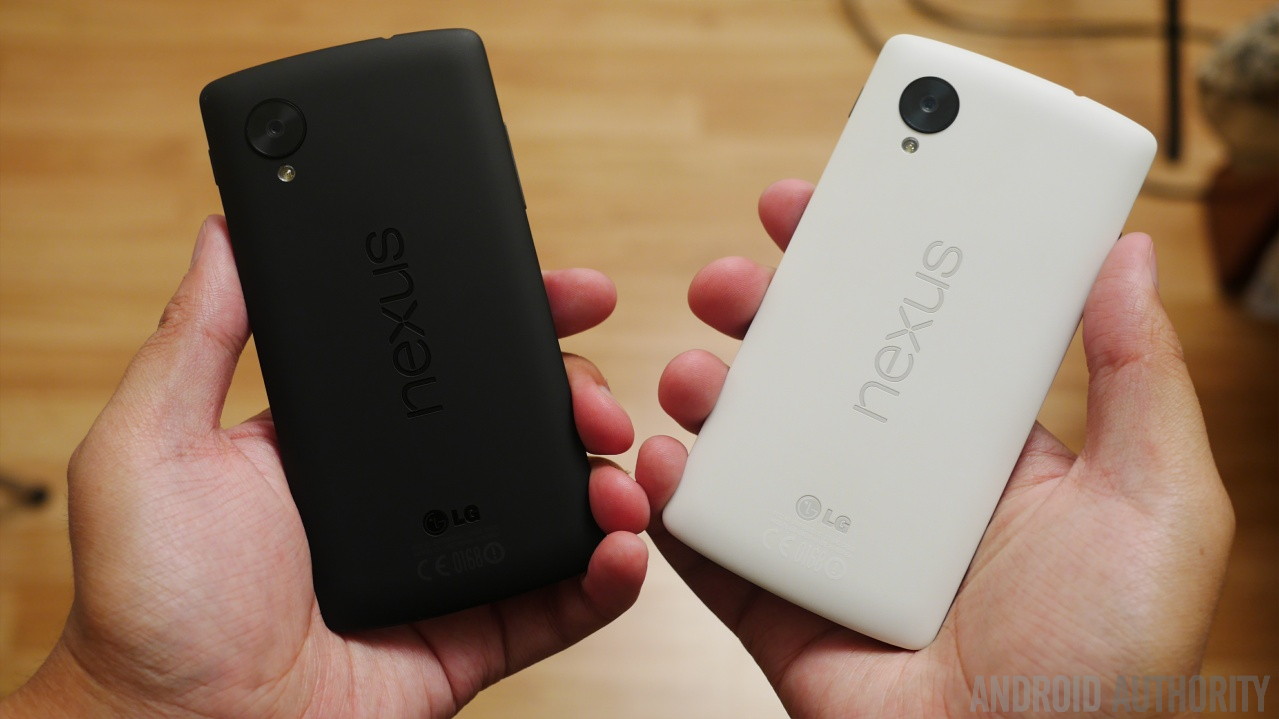
Starting up front, the black slate design is adorned by a screen that is nearly five inches large. As a matter of fact, it comes just short, at 4.95", and is surrounded by a respectable bezel that is neither too thin nor unattractively large. Above it, is the front facing camera, next to the phone speaker grill that sports a somewhat unique perforated look. The speaker grill on the other version of the Nexus 5 is (you guessed it) white, making it stand out even more.

Below the screen is a multi-color notification LED light. It's nice that the top and bottom bezels actually make the Nexus 5 easy to use in landscape mode, as they give you a place to rest your thumb while viewing content or playing games.
In this black version of the Nexus 5, the sides are comprised of soft touch plastic and house the entire button layout. All of the buttons have a nice meaty press and a very rigid feel that make them easy to find with your fingers. The power button on the right, however, is a little high up there and might require a hand adjustment in order to reach it. Below it is the SIM card tray.

Opposite this power button is the volume rocker and up top is the headphone jack. The bottom of the Nexus 5 has the microUSB charging port that, you may notice, is downward facing. A vast majority of phones have you insert your microUSB plug with the long portion facing down – this time, the long portion faces upward. Flanking the port are two grills for a speaker and microphone, respectively.
It's when you come to the back that the Nexus 5 really shows its character. Taking cues from the Nexus 7 tablet, this smartphone puts the Nexus logo in landscape and is a motif that we definitely appreciate. Perhaps the only real eye-catching aspect of the design is also found here, in the form of a large camera lens unit.
When you get this Nexus 5 in your hand, the first thing you notice is how light the phone is. While other devices like the Samsung Galaxy S4 have certainly rocked the lightweight 5-inch screen, it was somewhat surprising to feel it here. It's a pleasant lightness that doesn't make the phone feel cheap, though the soft touch plastic does help. Especially the black edition won't slip about in the hand, and, as quite the nimble device, the Nexus 5 feels like lighting in a box, especially considering everything that it is capable of.

Coming in at 4.95 inches, the Nexus 5 joins the ranks of the 5-inch screen devices that became immensely popular since the Nexus 4. LG is no stranger to high quality display experiences and the screen it put into the Nexus 5 is no exception. To be fair, this display is just short of the great one found on the G2, but that difference definitely does not detract from the overall experience.
This IPS screen is capable of 1080p resolution at 445 pixels per inch. Indeed, you'll be getting very high sharpness with crisp text and high detail. Colors also pop quite well on this display with a saturation level that is not too high as to make them burst out and punch you in the face. The default Android wallpaper provides a good example of how vivid everything looks.
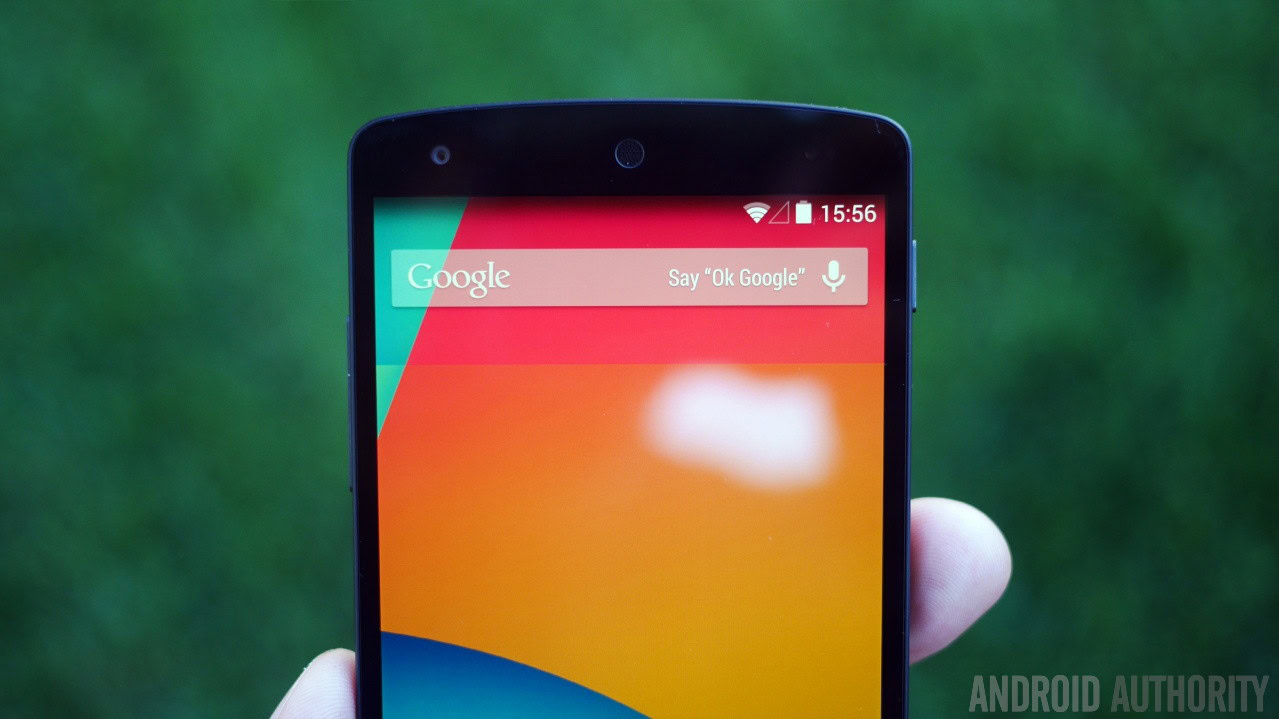
While pretty much anything looks great on the Nexus 5, one particularly good experience I had was with the new Plants vs Zombies 2, one of the more colorful games available in the Play Store. Not only did the sprites look incredibly crisp, it wasn't hard to really get immersed into the gameplay with the wonderful vividness.

One place that Google and LG really didn't want to compromise was in the performance aspect. The Nexus 5 comes with what is arguably the fastest processing package available today, the Snapdragon 800. Despite the short list of devices that currently rock this package, there is no denying how fast it can possibly go. The Snapdragon 800 is backed by Adreno 330 graphics and 2GB of RAM.

It is when the Snapdragon is coupled with the minimalistic stock Android experience that it really shines. Google's optimizations seem to have done the trick as Android 4.4 KitKat absolutely flies. Of particular note is the ability of the Nexus 5 to multitask. Using the recent apps screen to move in and out of apps is about as smooth as it has ever been and is, at least for me, the preferred method of general multitasking. Not to mention all of the new transitions that do true justice to this high speed processing. Going between just about any element in KitKat is accompanied by some sort of fade or circle wipe, making the phone feel really seamless.

Gaming is also quite easy, as the Adreno 330 makes titles like Dead Trigger 2 truck along without much trouble at all. Rest assured that the Nexus 5 is among the best in sheer processing, affording it the ability to present one of the best Android experiences available.
It's no secret that the Nexus line is supposed to keep things pretty simple, whether or not it's because of the price point or just because that's how the line works. The Nexus 5 follows in this tradition not only with its minimalistic design, but also with its admitted lack of extras.
The typical parts that are lacking are in the non-expandable storage and the non-removable battery. 16 or 32GB of onboard storage is available, with the 32GB model going for an extra $50. Inside of the phone, you get the same general bevy of expected connections. Wi-Fi, NFC, and Bluetooth 4.0 are available, along with the welcome return of wireless charging. Bust out your various charging mats and plop the Nexus 5 on there for easy power.

Anyone that missed full high speed connectivity with the Nexus 4 can look forward to the Nexus 5 and its full support of LTE connections. Using this phone on the AT&T network provided a very speedy mobile internet life outside of my otherwise Wi-Fi powered home. Speaking of AT&T, call quality on the network was also quite good, with the perforated speaker grill providing good, clear sound without clipping.
It should also be no secret that with a good price point come some concessions. These start with the speaker at the bottom of the phone. What I once thought was a dual speaker setup is actually just one speaker behind one grill and a microphone behind the other. Its relocation to the bottom of the Nexus 5 is a welcome one, but, unfortunately, the sound quality still leaves a lot of be desired. Not only does it lack dimension, it doesn't get loud enough to compensate for even moderate background noise. I listen to pretty much everything from my Bluetooth headphones, thankfully.

When it comes to the battery, we find another concession. This wasn't an expectation, however, as I (and many others looking forward to the Nexus 5) hoped that all of the promised power saving optimizations would allow an admittedly small 2300mAh battery unit to still make the phone go for a good while. This is only kind of the case.
While I have no doubts that general users will get exactly what they need out of the Nexus 5 – that is, one full day of work and play before nightly charging – I know that power users will end up pretty disappointed. I did go for a couple days waking up to sleeping with the phone only getting down to 20% but that was with the phone spending half of that time in my pocket. One particularly disappointing instance saw my phone get close to dying after only 9 hours of moderately heavy usage. As your usage of the phone gets heavier, so too do the returns start to diminish. It's best to consider the battery life as average – whether or not that is a big plus or weak point is up to how much you need it to withstand.

The Nexus 5 comes with an 8 megapixel shooter equipped with a very welcome LG addition of optical image stabilization (OIS). After the lackluster performers found in the Nexus 4 and its predecessor, the Galaxy Nexus, the Nexus 5 was to be, hopefully, a redemption in the optics department. Again, like in the battery, this is only somewhat the case. One thing that we can definitely say is that this is the best Nexus camera we've seen.
But that leaves all of the other wonderful performers in the Android space. And in that regard, the best way to think of the Nexus 5 camera is, again, average. In great lighting conditions – like in broad daylight – the camera generally performs very well. The addition of HDR+ to the stock Android camera app is welcome, as its processing allows for these good pictures to become much better, with much higher dynamic range and a saturation that makes each photo pop.

It is when you start to remove the light that the results start to become uneven. Pictures start to lose fidelity in the color reproduction and details start to become shades of grain. That is not to discredit the OIS in this camera – as a matter of fact, the OIS is a wonderful addition that allows the Nexus 5 camera to perform in pretty much any indoor situation and most low light environments. You can definitely take a low light shot — it's just the resulting photo that doesn't look as good as we hoped.
OIS also helps the videos, as all recordings are equally stabilized. If you're already trying to have a steady hand, you'll get a pretty damn smooth video. When you're not trying quite as hard, the stabilization still does the job quite well.
The overall camera experience is also ultimately hindered by an app that, while pleasantly simplistic in its design, lacks intuitive controls and speed. The touch and swipe menus are nice too look at and are far from intrusive but until you can somehow memorize where every setting is located, usage is more hide and seek than anything else. Actually taking the photos also takes some time, as the focusing time already leaves a little to be desired, but then the app has to take a little time processing before you're sure the file has been created.
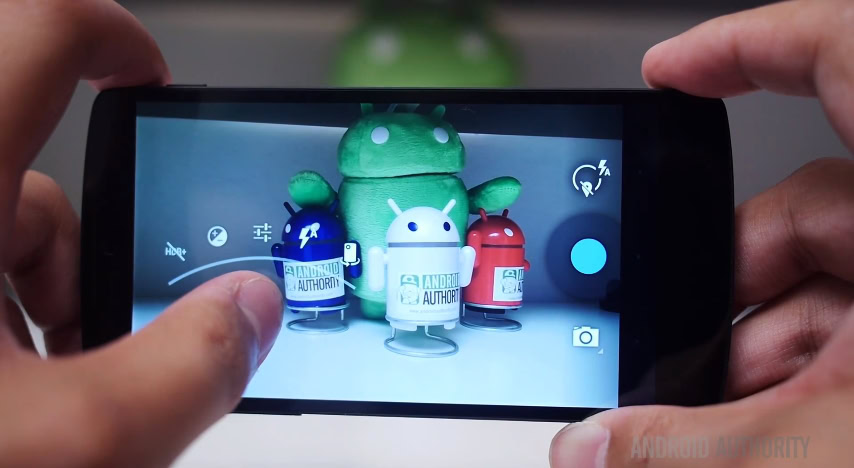
It's more than a little disappointing to know that Google touted the Nexus 5 as a device made for "capturing life's moments." When this is considered, the Nexus 5 camera falls short. However, I wouldn't go as far as to say it is the worst camera I've ever used. It's still capable of considerably good shots (especially with HDR+ kept on) and the OIS is a very welcome addition that greatly improves low light performance. It's not an amazing camera, but it's still one that you'll be happy to have when the time comes.
Android 4.4. KitKat. The software of the Nexus 5 was perhaps as hotly anticipated as the phone itself. With an update schedule that pretty much stands alone, the Nexus line is looked to for the greatest possible Android experience available anywhere. The Nexus 5 carries these expectations, so does it hold up? Yes, it does, especially on the back of KitKat.
Even from just the homescreen you get a good glimpse at some obvious enhancements. A generally flatter profile graces the elements of 4.4, which does away with the Holo blue and comes with a new font. The blue is still in the Settings, however, which is somewhat odd. The flatness makes for a nice color experience as every icon and colorful default wallpaper pops out of the good screen. It looks so nice, in fact, that I was almost inclined to keep the default wallpaper because it showcases this evolution of Android quite well.

One reservation I did have with the updated Android look was with its bubbliness. That is a suitable term, as plenty of elements have been given a much more rounded look and certain parts like the folders and even the app drawer button are perfect circles. I was worried that Android was getting a little bloated and almost cartoonish a la TouchWiz. Thankfully, this was only a fleeting concern, as I found KitKat's sum of its parts easily made this concern fade in some time. One stylistic choice like this didn't detract from the overall experience, which is to the credit of this new Android version.
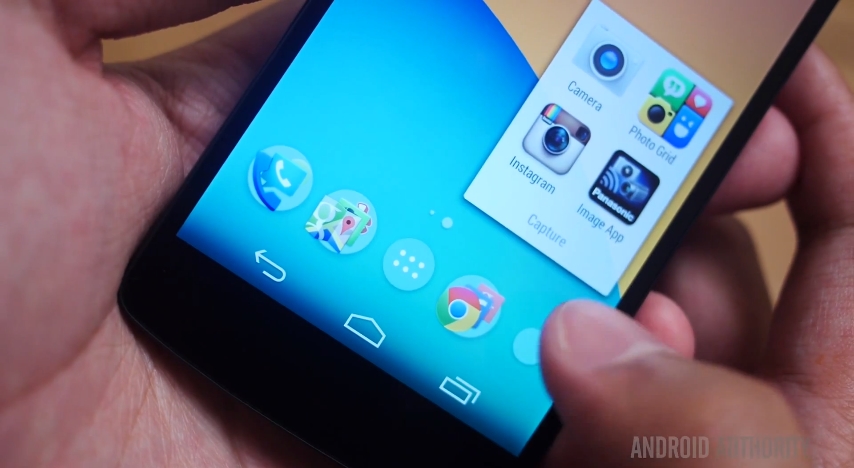
The notification bar and the one housing the softkeys have also been given more transparency. Unless the app or screen requires a uniform color, the bars will remain clear. They will also move out of the way in more applications, like when reading books or playing video games. A simple swipe down from the top will make it reappear in these situations, helping to display notifications where before you were required to exit the app.

The other obvious change seen in the homescreens deals with Google Now. While you can still bring up the powerful and contextual search application by swiping up from the home button, it is also now a second homescreen found all the way to the left. Whereas, in the past, I once urged everyone to use Google Now more (it really is that good), that will probably be an inevitability as it is now integrated into your home experience.
Google Now's integration doesn't stop there, as you can also now say the phrase "OK Google" to bring up a quick, voice controlled search. Comparisons to the Moto X Touchless Control will undoubtedly be made and while I do miss being able to perform my tasks at any time, unlocking the phone and uttering the phrase still doesn't feel like it takes much time at all due to the smooth transitions and sheer speed of the Nexus 5.
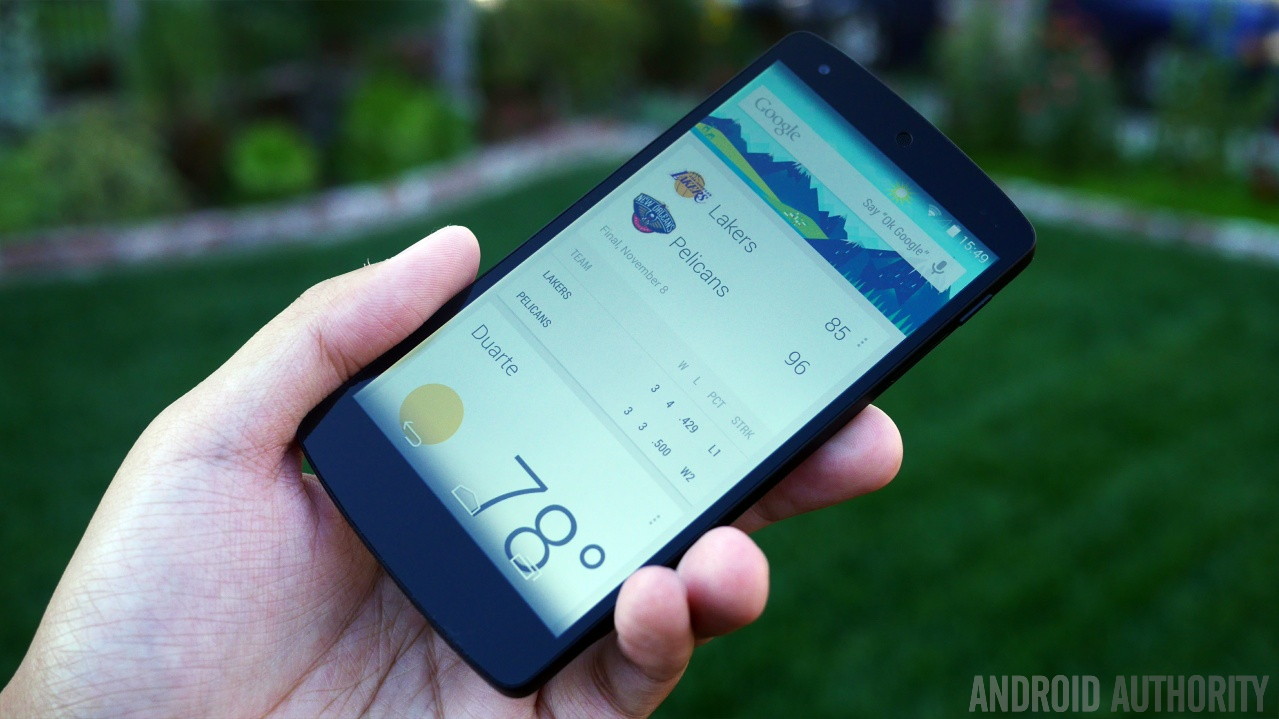
Delve into some apps and you'll find updates there, too. It's been well documented that Hangouts now integrates SMS messages, though they are now categorized separate from the actual Hangout chats. A personal bummer for me here is that it still doesn't integrate Google Voice (which can't come soon enough).
The phone dialer has been given search abilities too, as you can now punch in words and Google will search for nearby places or businesses that match it. It's a nice and handy "phonebook" style tool that could help in a pinch. I have found, however, that it isn't truly consistent – trying to find a local restaurant's number didn't work, for example, as the location wasn't listed in the results. "OK Google"-ing and searching that way proves to be far more reliable and, at least in this case, was much faster.

Perhaps what makes KitKat (and, ostensibly, the Nexus 5) a success is the big picture. While it's clear that search is basically bleeding into so many parts of the Android experience, the way they're wrapped up in KitKat goodness helps keep everything feeling fresh, smooth, and ultimately as functional as they have ever been. A more vivid and colorful coating makes for an Android experience that is better than anything the Nexus line has put out before — and, at least for me, perhaps the best one available on any Android phone. Whether or not that is true for you depends on if you prefer the way stock Android gets everything done without a huge bag of tricks, using only what is truly needed.

Perhaps the most attractive part of the Nexus 5 is its price. While it wasn't quite true until the Nexus 4, we've come to expect the Google-official line to provide great performance with a price that almost feels unreal. This new iteration is no exception, as the base 16GB model comes in at $349 dollars and the 32GB model is $399. Considering the plethora of devices out there that come in at over $700 unlocked, and sometimes at $200 with debilitating contracts, it almost seems like a no-brainer.

The Nexus 5 is far from a perfect phone. Then again, what phone is perfect? There had to be some concessions and while they might bum you out, you have to remember that this package provides one of the best Android experiences ever at a price that is still a surprise considering it is unlocked. In certain respects, the Nexus 5 absolutely excels, like in its performance. In other places (maybe not the battery life), this new Nexus still provides good experiences even if it doesn't blow away the competition.
I would probably stop short of calling the Nexus 5 a top-tier phone because, if it was truly trying to be, I'm sure LG and Google would have succeeded with flying colors. Instead, remember how much you're paying for an unlocked powerhouse and then think of the Nexus 5 as a smartphone that gives you the essentials – exactly everything you need – without much fuss at all.
Turn Google Play Money Into Real Money
Source: https://www.androidauthority.com/nexus-5-review-316474/
Posted by: linaresfespon78.blogspot.com

0 Response to "Turn Google Play Money Into Real Money"
Post a Comment